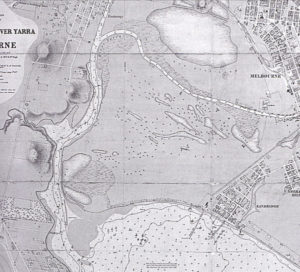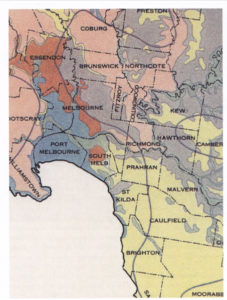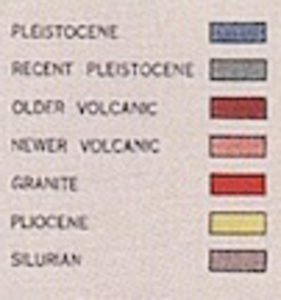Early history of the land
The early history of the land that is now Westgate Park
This part of Melbourne was formed by volcanic action 30 million years ago. Layers of silt and gravel were deposited over time and sea levels rose and fell. 50,000 years ago the latest layer of Coode Island silt was laid down and sea levels were at least 3 meters above the present level. 10,000 years ago Port Phillip Bay was a land mass and a vast hunting ground for Aboriginal people. The mouth of the Yarra River was at its southern-most end. Evidence suggests that 4,000 years ago Fishermans Bend and large areas of central Melbourne was however still under water
At the time of European settlement sea levels had risen to present levels and a layer of sand dunes about 10 meters deep had formed over the silt. Much of this sand was subsequently carted away and used for building purposes, ship ballast and glass works.
The ‘bend’ was formed when the course of the Yarra River (Birrarung) was shortened, cleared of debris and deepened for shipping.
Life on the Bend– a social history of Fishermans Bend, July 2017 provides a useful background history for the area that now includes Westgate Park. It was:
- a place to some extent cut off from the rest of Melbourne, and characterised by a landscape that was sandy, watery and scrubby, and not particularly favourable in the eyes of British settlers.
From the beginning of British colonisation in the 1830s, Aboriginal people shared this place with the newcomers. Competition for land, water and food resources, combined with high rates of disease and death, had catastrophic consequences for the Aboriginal population and they were eventually pushed out to the fringes of the city.
A small number of fisherfolk lived in shacks along the beach and the Yarra in amongst remnants of the natural environment including plentiful birdlife. However by the 1950s intensive industry was producing toxic, smelly waste. In the area that includes what is now Westgate Park, horse and car racing, a sand mine, an aircraft runway and rubbish tips largely destroyed what little remained of nature.



